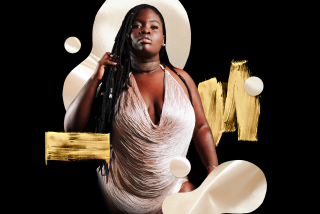Makeba Finds Cosmetic Changes in South Africa : Politics: The internationally acclaimed singer has been in exile for 31 years. ‘Apartheid is still alive,’ she says. ‘I can go home but I cannot vote.’
- Share via
JOHANNESBURG, South Africa — Miriam Makeba coughed, and someone immediately asked if the cause was Soweto smog.
She smiled at this reference to her hometown’s distinctively grimy air. That was one memory, she explained, that she didn’t have to bring with her during 31 itinerant years of exile.
“No, there’s smog all over the world,” she said.
South Africa’s greatest musical export came home last week. Behind her were 31 years that included the start of a great international singing career and more than one person’s share of setbacks and affronts.
The initial setback came during a four-week trip to the United States in 1960 when, reporting to the South African Consulate in Chicago to renew her passport, she saw the consul stamp her passport “Invalid,” certifying that she was forbidden to re-enter her country.
That act, which turned a four-week trip into a 31-year ordeal, imprisoned her as if a cell door had slammed, exiling quintessentially African artist from her African homeland.
Miriam Makeba’s voice was perfectly suited to the sophisticated rhythms and chantsongs of African music, combining the clarity of a Joan Baez with the timing and throaty authority of a Sarah Vaughan. Her discovery in 1958, at the age of 26, when she joined a tour of a musical called “King Kong” seemed preordained.
“I’m not a politician, I am a singer,” she said Friday at her first press conference since re-entering South Africa. But from that moment in Chicago, she could not separate herself from politics, the curse of the South African artist. In 1963 she testified before the United Nations, and the South African government banned the sale of her records.
In 1968 she married the black American radical Stokely Carmichael. They visited Cuba. American bookings evaporated, and recording contracts were canceled. She lived in Guinea for a while, the guest of former President Sekou Toure. Eventually, she settled in Brussels.
“I wanted to come home to make sure that I could come home,” the 58-year-old singer said, as if testing the trustworthiness of the South African government. “I said to the children that we will go together when it’s for a long time, when they can see all the relatives and places in the country.”
“There are some cosmetic changes--I see we’re all sitting here together without the police coming,” she said to an audience of a couple of hundred journalists and onlookers from the stage of Johannesburg’s Market Theatre. “That is something. But I believe that the fundamental things are still intact. Apartheid is still alive. I can go home but I cannot vote, the Land Act is still intact, the Bantu Education Act is still intact. There’s very little change.
“When I went to my mother’s grave, I knelt down and tried to make a prayer. That was the most painful thing that could have happened--because I loved my mother. I would have liked to see her body. I was denied that. I felt: ‘Why, why did this happen?’ ”
One thing she did discover was a peculiarly South African impulse to put her to work as a symbol. The buzz of questions about her “program”--whether and when she would perform, where she would make public appearances--interfered with what she viewed as a largely personal errand.
“I don’t sell records,” she said. “I don’t get gold records. I’m not on the hit parade. Long ago they said, ‘That one, she sings politics.’ I don’t sing politics; I merely sing the truth.”
More to Read
Sign up for Essential California
The most important California stories and recommendations in your inbox every morning.
You may occasionally receive promotional content from the Los Angeles Times.













